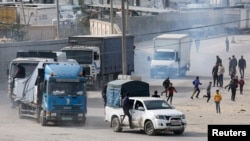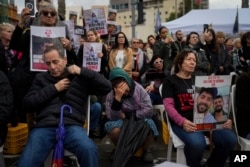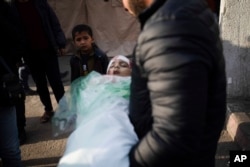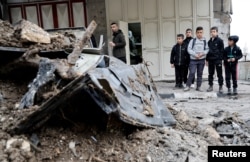Medicine for hostages held by Hamas militants in Gaza is to be delivered Wednesday under a deal brokered by France and Qatar.
France said the medication is destined for 45 hostages who have chronic illnesses, and that the delivery will be made with the help of the International Red Cross.
Qatar said the agreement also included medicine and other humanitarian aid for Palestinian civilians in the Gaza Strip.
As the Israel-Hamas war rages in its fourth month, U.S. Secretary of State Antony Blinken reiterated that a "pathway to a Palestinian state" is essential for peace in the Middle East.
Israel would not “get genuine security absent that," the top U.S. diplomat said Wednesday at the World Economic Forum's annual meeting in the Swiss ski resort of Davos.
Blinken said if Israel and several Arab countries work together, they could isolate Iran, which he called "the biggest concern in terms of security," as well as its proxies. Those include Yemen's Houthi rebels who have been attacking commercial ships in the Red Sea.
"The problem is getting from here to there, and of course, it requires very difficult, challenging decisions. It requires a mindset that is open to that perspective," Blinken said.
But he said currently "we're in the midst of what is human tragedy in so many ways in the Middle East right now — for the Israelis and Palestinians alike."
A day earlier, Saudi Arabia's foreign minister, Prince Faisal bin Farhan, said during a Davos panel that his country agreed "regional peace includes peace for Israel" and responded "certainly" when asked if Saudi Arabia would recognize Israel as part of a larger political agreement.
"But that can only happen through peace for the Palestinians, through a Palestinian state," he said.
Israeli Prime Minister Benjamin Netanyahu leads a right-wing government that is opposed to Palestinian statehood, and Netanyahu himself recently said that his actions over the years prevented the formation of such a state.
Blinken said Israelis would need to decide on their leadership and direction, saying it's up to them whether the country can "seize the opportunity that we believe is there." He called this "an inflection point" for the Middle East that requires hard decisions.
Hamas militants abducted about 240 people during the October 7 attack on Israel during which they also killed about 1,200 people, according to Israeli tallies. Israel began its military campaign to wipe out Hamas after that attack.
More than 100 hostages were released during a temporary truce in November, but about 130 are believed to still be held by Hamas in Gaza, including two dozen or so who could already be dead.
The United States said Tuesday it is hopeful that talks brokered through Qatar could lead to a new deal to release the hostages in exchange for a cease-fire in the fighting between Hamas and Israel.
"I don't want to say too much publicly here as we have these talks, but we're hopeful that it can bear fruit, and bear fruit soon," National Security Council spokesman John Kirby told reporters at a White House briefing.
The war continued Wednesday with Israel’s military saying it killed six Palestinian fighters, including a Hamas officer it said was in charge of interrogating suspected spies in southern Gaza.
Gaza health authorities said that in the last day Israeli forces had killed 163 people in the Palestinian enclave, raising their toll for the war to 24,448, a figure that includes both Hamas fighters and civilians.
Since the war began in October, Israeli forces have also killed more than 350 Palestinians in the occupied West Bank, according to the Hamas-run Palestinian Ministry of Health. The deaths have mostly come during protests and Israeli military raids.
The Israeli military said Wednesday it carried out an airstrike that killed a senior Palestinian militant in the West Bank city of Nablus. It accused Ahmed Abdullah Abu Shalal of being responsible for planning multiple attacks against Israelis in Jerusalem.
Four others were killed in the attack in the Balata refugee camp, the Israeli military said.
The Palestinian Red Crescent said Israeli forces prevented medical personnel from reaching the airstrike site to evacuate the wounded, including directing gunfire at its teams.
The organization also said Israeli troops blocked ambulance teams from entering the Tulkarm refugee camp in the West Bank after Israeli shelling there injured multiple people.
There has been no comment from Israel on the Palestinian allegations.
Some information for this report was provided by The Associated Press, Agence France-Presse and Reuters.










